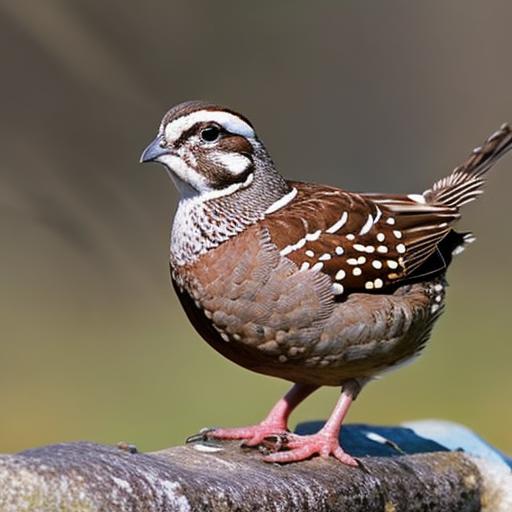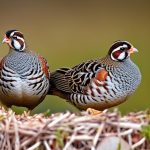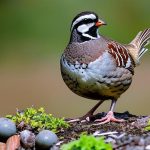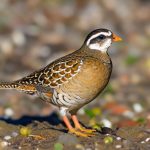Free range quail keeping is a popular and rewarding hobby for many people. Quail are small, ground-dwelling birds that are known for their delicious eggs and meat. Keeping quail in a free range environment allows them to exhibit their natural behaviors and forage for their own food, resulting in healthier and more flavorful eggs and meat. When starting a free range quail operation, it’s important to consider the space and resources needed to provide a suitable environment for the birds. Additionally, understanding the feeding and nutritional needs of quail, as well as how to manage their health and reproduction, is crucial for success.
Quail are social birds that thrive in small flocks, so it’s important to start with at least a few birds to provide companionship. They are also ground-dwelling birds, so a suitable environment for free range quail should include plenty of open space for them to roam and forage. Providing natural cover such as shrubs, tall grasses, and trees can also help quail feel secure and provide protection from predators. Additionally, quail require access to clean water at all times, so a reliable water source is essential. Overall, creating a natural and spacious environment for free range quail is key to their health and well-being.
Key Takeaways
- Free range quail require a spacious and natural environment to thrive
- Providing a balanced diet with access to natural foraging is essential for free range quail
- Regular health checks and proper sanitation are crucial for disease management in free range quail
- Understanding the breeding behavior and providing suitable nesting areas is important for successful reproduction of free range quail
- Implementing predator-proof measures and providing shelter are key for protecting free range quail from harm
Choosing the Right Environment for Free Range Quail
When it comes to choosing the right environment for free range quail, there are several factors to consider. First and foremost, quail need plenty of space to roam and forage. A minimum of 1-2 square feet per bird is recommended to ensure they have enough room to exhibit natural behaviors and avoid overcrowding. Providing a diverse landscape with open areas for foraging, as well as natural cover for protection, will help create an ideal environment for free range quail. This can include grassy areas, shrubs, trees, and even small ponds or water sources for bathing.
In addition to space and natural cover, it’s important to consider the safety of the environment for free range quail. Predators such as foxes, raccoons, and birds of prey pose a threat to quail, so implementing measures to protect them is crucial. This can include installing fencing around the perimeter of the free range area, using netting or wire mesh to cover the top of the enclosure, and providing secure housing for the birds to roost at night. By creating a safe and natural environment for free range quail, keepers can ensure the health and well-being of their birds while allowing them to exhibit their natural behaviors.
Feeding and Nutrition for Free Range Quail
Feeding and nutrition are essential aspects of free range quail keeping. Quail are omnivorous birds that require a balanced diet to maintain their health and productivity. In a free range environment, quail have the opportunity to forage for insects, seeds, and vegetation, which can supplement their diet and provide essential nutrients. However, it’s important to also provide supplemental feed to ensure they are receiving all the necessary nutrients they need to thrive.
A high-quality game bird feed that is specifically formulated for quail is recommended as a staple in their diet. This feed should contain a balanced mix of protein, vitamins, and minerals to support the health and productivity of the birds. Additionally, offering grit or small stones can help quail with digestion by aiding in the breakdown of food in their gizzards. Providing access to clean water at all times is also crucial for quail health and digestion. By ensuring that free range quail have access to a balanced diet and clean water, keepers can support their overall health and productivity.
Health and Disease Management for Free Range Quail
Maintaining the health of free range quail is essential for their well-being and productivity. Preventing disease and managing potential health issues is crucial for keeping a successful free range quail operation. One of the best ways to prevent disease in quail is by providing a clean and sanitary environment. Regularly cleaning feeders, waterers, and housing can help reduce the risk of disease transmission. Additionally, monitoring the flock for any signs of illness or distress can help catch potential health issues early on.
It’s also important to provide regular access to fresh water and a balanced diet to support the overall health of free range quail. Ensuring that they have access to clean water at all times and providing a high-quality game bird feed can help support their immune systems and overall well-being. In the event that a quail does become ill, it’s important to consult with a veterinarian who has experience with poultry to diagnose and treat any health issues. By implementing good management practices and monitoring the health of free range quail regularly, keepers can help prevent disease and maintain a healthy flock.
Breeding and Reproduction of Free Range Quail
Breeding and reproduction are important aspects of free range quail keeping for those who are interested in expanding their flock or producing eggs and meat. Quail are prolific breeders that reach sexual maturity at around 6-8 weeks of age, making them relatively easy to breed. When it comes to breeding free range quail, it’s important to provide suitable nesting areas where hens can lay their eggs in privacy. This can include providing nesting boxes or natural cover such as tall grasses or shrubs where hens can lay their eggs.
Once eggs are laid, it’s important to collect them regularly to prevent them from being damaged or eaten by predators. Incubating quail eggs can be done using an incubator or allowing broody hens to sit on the eggs until they hatch. Providing a warm and secure environment for hatching eggs is crucial for successful reproduction. Additionally, providing proper nutrition and access to clean water for breeding quail is essential for supporting healthy reproduction. By understanding the breeding behaviors of free range quail and providing suitable nesting areas, keepers can successfully manage the reproduction of their flock.
Predators and Protection for Free Range Quail
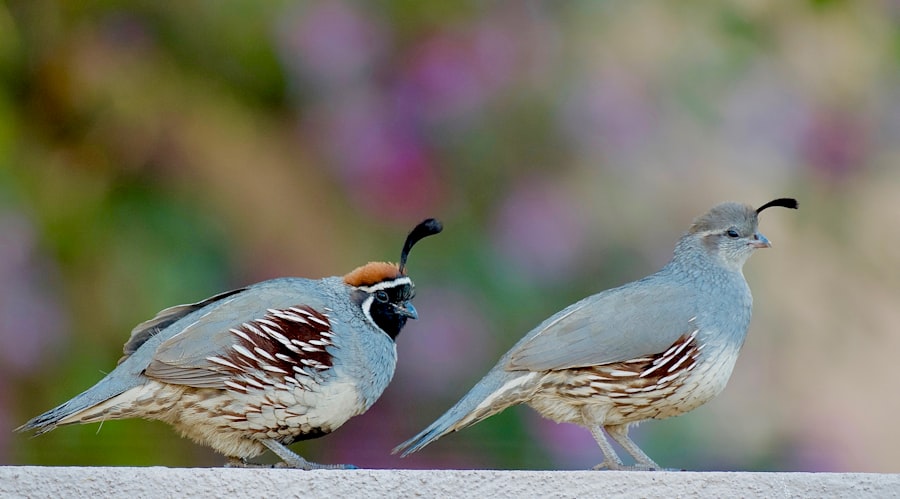
Predators pose a significant threat to free range quail, so implementing measures to protect them is crucial for their safety and well-being. Common predators of quail include foxes, raccoons, birds of prey, snakes, and even domestic pets such as cats and dogs. Fencing around the perimeter of the free range area can help deter ground-based predators, while covering the top of the enclosure with netting or wire mesh can prevent attacks from birds of prey.
Providing secure housing for free range quail to roost at night can also help protect them from predators. This can include using sturdy coops or shelters that are predator-proof and providing locking mechanisms on doors or entrances. Additionally, regularly monitoring the free range area for signs of predator activity can help keepers identify potential threats early on. By implementing measures to protect free range quail from predators, keepers can help ensure the safety and security of their flock.
Benefits of Free Range Quail Keeping
There are numerous benefits to keeping free range quail that make it an attractive hobby for many people. One of the main benefits is the delicious eggs and meat that quail produce. Quail eggs are known for their rich flavor and high nutritional value, making them a popular choice among chefs and home cooks alike. Additionally, quail meat is lean and flavorful, making it a sought-after protein source for many people.
Keeping free range quail also allows them to exhibit their natural behaviors and live in a more natural environment compared to traditional confinement methods. This can result in healthier and more flavorful eggs and meat due to the varied diet and exercise that free range quail receive. Additionally, keeping free range quail can be a rewarding experience for those who enjoy observing the natural behaviors of these small birds.
Overall, keeping free range quail can be a fulfilling hobby that provides delicious eggs and meat while allowing the birds to live in a more natural environment. By understanding the basics of free range quail keeping, choosing the right environment, managing feeding and nutrition, maintaining health, managing reproduction, protecting from predators, keepers can create a successful free range quail operation that provides numerous benefits for both the birds and themselves.
If you’re interested in free range quail keeping, you might also want to check out Poultry Wizard’s article on “How Many Chickens Do You Need for a Family of 4?” Understanding the dynamics of poultry keeping can provide valuable insights into managing a diverse range of birds on your property. (source)
FAQs
What is free range quail keeping?
Free range quail keeping refers to the practice of allowing quail to roam freely in a natural environment, rather than keeping them confined to cages or enclosures. This allows the quail to exhibit natural behaviors and forage for their own food.
What are the benefits of free range quail keeping?
Free range quail keeping can provide several benefits, including improved animal welfare, reduced stress for the quail, and the opportunity for the quail to forage for a more varied and natural diet. Additionally, free range quail may produce eggs with a richer flavor and higher nutritional content.
What do free range quail need to thrive?
Free range quail require access to a suitable outdoor environment with plenty of space to roam and forage. They also need protection from predators, access to clean water, and suitable shelter to protect them from the elements.
Are there any challenges associated with free range quail keeping?
Some challenges of free range quail keeping include the risk of predation, the need for secure fencing to prevent the quail from wandering too far, and the potential for disease transmission from wild birds. Additionally, free range quail may be more difficult to monitor and manage compared to quail kept in enclosed environments.
What are some considerations for free range quail keeping?
When considering free range quail keeping, it’s important to research local regulations and zoning laws, as well as to carefully consider the potential impact on the surrounding environment and wildlife. Additionally, it’s important to provide appropriate care and management to ensure the health and well-being of the quail.
Meet Walter, the feathered-friend fanatic of Florida! Nestled in the sunshine state, Walter struts through life with his feathered companions, clucking his way to happiness. With a coop that’s fancier than a five-star hotel, he’s the Don Juan of the chicken world. When he’s not teaching his hens to do the cha-cha, you’ll find him in a heated debate with his prized rooster, Sir Clucks-a-Lot. Walter’s poultry passion is no yolk; he’s the sunny-side-up guy you never knew you needed in your flock of friends!

